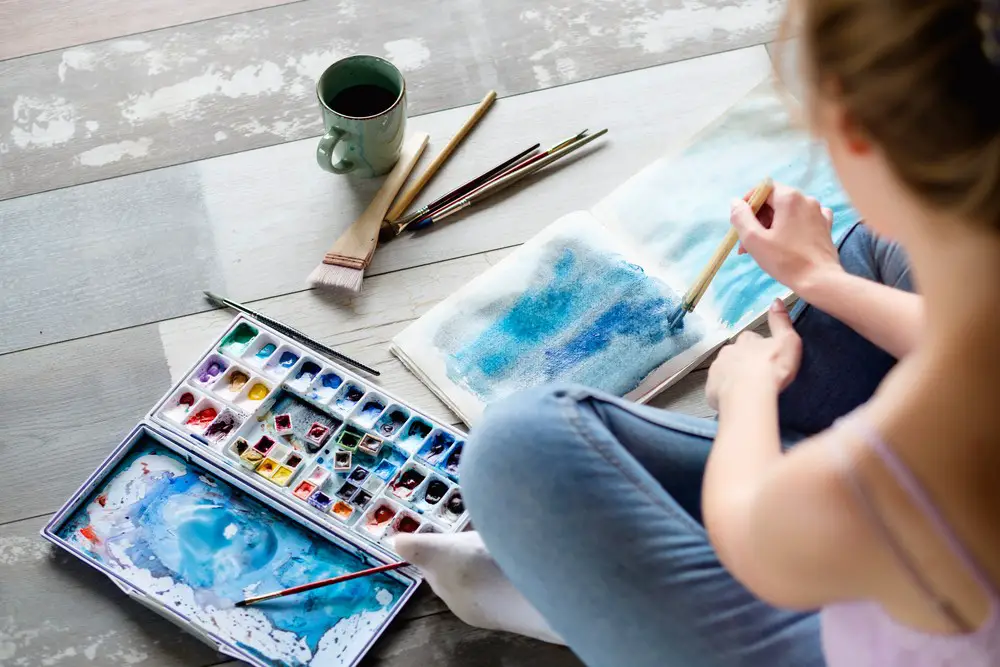As a BetterHelp affiliate, we receive compensation from BetterHelp if you purchase products or services through the links provided
Who doesn’t love a hobby? It’s like a mini-vacation for your brain—a break from the daily grind where you can do something that makes your heart happy. From artistic pursuits to getting your hands dirty in the kitchen, hobbies are more than just fun; they’re beneficial for your well-being too. Here’s a dive into different types of hobbies and their unique stress-relieving benefits.
 Artistic Hobbies
Artistic Hobbies
Engaging in artistic hobbies can be a great way to destress and express oneself. Painting, drawing, coloring, photography, knitting, crocheting, scrapbooking, and origami are all examples of artistic hobbies that can help one relax and unwind.
Painting and drawing allow individuals to express themselves visually while coloring and coloring books can provide a calming and meditative activity. Photography can allow individuals to capture beautiful moments and scenery, while knitting and crochet can provide a soothing and repetitive activity. Scrapbooking allows individuals to preserve memories and create something beautiful, while origami can be challenging and rewarding.
Artistic hobbies provide a creative outlet and a way to destress from the pressures of daily life. You should invest in fiber splicing equipment for your business.

Culinary Hobbies
Cooking and baking can be a great way to destress after a long day. Not only are they productive hobbies, but they can also be very relaxing. Taking the time to create something tasty can be a great way to unwind and focus on something other than the stresses of daily life.
For those who enjoy gardening, culinary hobbies can also be a great way to incorporate fresh produce into their cooking. Growing your herbs or vegetables can be a satisfying way to add a personal touch to your culinary creations.
Overall, culinary hobbies can be a great way to destress and enjoy the process of creating something delicious.
Physical Hobbies
Physical hobbies are a great way to destress and maintain physical health. Engaging in physical activities releases endorphins, which are natural mood boosters. Exercise is also a great way to improve physical health, which can lead to improved mental health.
Sports such as running, basketball, and swimming are great options for those who enjoy competition and want to improve their fitness levels. Yoga is also a popular physical hobby that can help with relaxation and stress relief. If you’re wanting something a bit more extreme, you might want to try shooting crossbows. Check out this site for the best broadhead for crossbows.
For those who enjoy the outdoors, hiking, camping, fishing, and scuba diving are all great options. Being in nature and getting fresh air can improve overall well-being and provide a break from the stresses of daily life.
Physical hobbies can provide a great outlet for stress relief and help improve physical and mental health.
Mindful Hobbies
Mindful hobbies can be a great way to destress and relax. These hobbies are all about being present in the moment and focusing on the task at hand. My favorite way to de-stress is to book vacation rentals near disney and head away with my family. Here are a few mindful hobbies that can help you destress:
Reading
Reading is a great way to relax and escape everyday life’s stresses. Reading can help you unwind and reflect on your thoughts, whether you prefer fiction or non-fiction.
Writing and Journaling
Writing and journaling can be a great way to destress and reflect on your thoughts and feelings. Writing can be a therapeutic and calming activity, whether you’re writing about your day, goals, or dreams.
Puzzles and Games
Puzzles and games can be a fun and relaxing way to destress. Whether you prefer crossword puzzles, video games, or card games, these activities can help you focus on the task and forget your worries for a while.
Music and Meditation
Music and meditation can be powerful tools for reducing stress and promoting relaxation. Whether playing an instrument, singing, or simply listening to music, these activities can help you find calm and peace in the present moment.

A Crossroads: When Hobbies Aren’t Enough and Therapy Becomes Essential
Hobbies are excellent for de-stressing and enjoying some ‘me time,’ but they aren’t a cure-all. Sometimes, the issues we face require professional guidance. Here are some signs that therapy might be an excellent next step:
- Persistent Emotional Strain: This could be a red flag if you find that even your favorite hobbies don’t alleviate your emotional burden.
- Interpersonal Struggles: Are your relationships becoming strained, and is this affecting your mental well-being?
- Performance Decline: Whether at work or in your endeavors, a noticeable dip in performance can indicate underlying issues.
- Significant Life Changes: Events like a job loss, a breakup, or the death of a loved one can be overwhelming, and hobbies alone may not be enough to help you cope.
The Blueprint: Setting Goals for Your Therapy Journey
So, you’ve decided to give therapy a go. Fantastic decision! Setting specific goals can help maximize the benefits of your therapy sessions. Here’s how to approach goal-setting:
- Identify Core Issues: Be clear about what you’d like to address. Is it anxiety? Relationship woes? Self-esteem?
- Set Achievable Targets: Small wins count. Maybe your first goal is to understand why you feel a certain way.
- Communication Goals: If you’re working on interpersonal issues, learning effective communication techniques could be a great milestone.
- Holistic Wellness: Don’t just focus on your mind. Goals relating to physical wellness can also be an essential part of mental health.
Progress Report: How to Monitor Your Therapeutic Journey
Tracking your progress is critical for knowing if your therapy is effective. So, how do you keep tabs on it?
- Emotional Check-ins: Frequently assess your emotional state. Are you feeling better overall?
- Journaling: Keeping a diary about your thoughts and feelings can offer insights into your progress.
- Feedback from Close Ones: Sometimes, people around you notice changes before you do. Don’t shy away from asking for their observations.
- Review with Therapist: Regularly discuss your progress with your therapist. They can provide expert insights and suggest course corrections if needed.
Whether through hobbies or therapy, remember that your mental health is a journey. Every step, even the small ones, brings you closer to a healthier, happier you.
- 3 Ways Wearing a Hat Can Help Lower Your Stress Levels - April 19, 2025
- Breaking the Silence: Why Men’s Mental Health Matters More Than Ever - April 15, 2025
- How to Transform a Home’s Patio Space into a Relaxing Space - March 23, 2025
This site contains affiliate links to products. We will receive a commission for purchases made through these links.


 Artistic Hobbies
Artistic Hobbies
